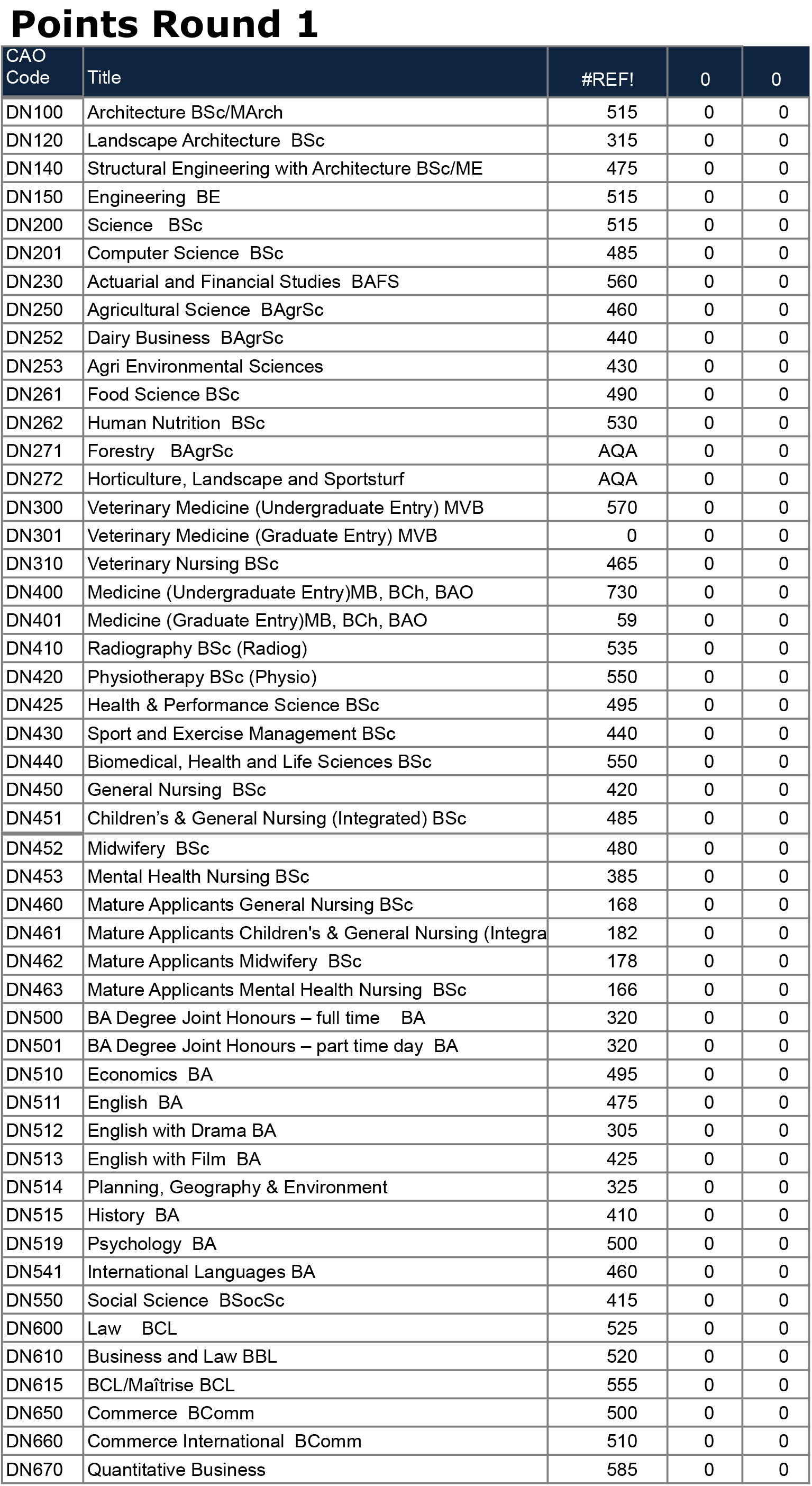STEM subject points rise at UCD
Posted August 22, 2016
• First round points on 22 of the 44 (50%) of the degrees at University College Dublin have increased over final round points in 2015
• Points in Science, Technology, Egineering and Maths (STEM) subjects continue to surge, reflecting strong demand from students
• 17 of the 44 degrees now require in excess of 500 points and of course many students on other courses will have more than the minimum points requirement. This reflects the year-on-year increase in first preference demand for UCD degrees
• (opens in a new window)Quantitative Business (DN670) is the highest entry degree at 585 points
• The largest increases are in construction-related degrees: with (opens in a new window)DN100 Architecture increasing by 25 points to 515 and (opens in a new window)DN140 Structural Engineering with Architecture increasing by 65 points to 475
• (opens in a new window)DN511 English is also up 50 points to 475
• UCD continues to reduce the number of entry codes.
See below: Table representing the CAO Round 1 points for UCD in 2016
Engineering & Computing
Points for (opens in a new window)Engineering (DN150) have risen to 515. This engineering degree – which commanded the highest points nationally last year – takes in 250 students and lets them specialise in later years in a range of areas, including electronic, energy or biomedical engineering, as well as in traditional civil and mechanical engineering.
(opens in a new window)Computer Science (DN201) has increased by 15 points to 485. In 2014, UCD increased the class size by 50% to 105 places, as both demand and calibre continues to grow year on year.
Science
Science at UCD takes 400 CAO students into common entry DN200. Points have risen to 515 – (which may also be the highest in Ireland). The high calibre of students entering the science programme reflects the widespread popularity of science – be it for a career in science or as valuable undergraduate degree in its own right.
Business, Finance and Law
All of the degrees in this suite require 500+ points. The (opens in a new window)BBL Business and Law (DN610) dropped 10 points to 520. (opens in a new window)Law BCL (DN600) rose 5 to 525.
(opens in a new window)Commerce (DN650) points remained at 500. (opens in a new window)Actuarial & Financial Studies (DN230) fell 10 to 560 while (opens in a new window)Quantitative Business (DN670) rose to 585, despite an additional 10 places bringing the number of CAO students in this class to 60.
Agriculture and Food
The largest degree in (opens in a new window)Agricultural Science (DN250) takes in 160 students. Points have fallen by 10 to 460. (opens in a new window)Human Nutrition (DN262) and (opens in a new window)Food Science (DN261) remain high. The new entry route (opens in a new window)(DN253) Agri-Environmental Science requires 430 points, while (opens in a new window)Forestry (DN271) and (opens in a new window)Horticulture (DN272) have gone straight to AQA.
Health Sciences
Undergraduate entry to (opens in a new window)Medicine (DN400) has fallen to 730 points and is one of the very few courses with random selection – which means not all students on these points will receive an offer.
Movements in points in nursing vary depending on the type.
Arts & Social Science
The UCD BA common entry degree (opens in a new window)DN500 is the largest single degree programme in the country with an intake of over 1,200. With the increased demand for business and professional degrees the demand for Arts degrees continues to show weakness and first round points this year are down 10 to 320.
(opens in a new window)Social Science (DN550) also fell by 5 points to 415.
Deputy President of UCD Mark Rogers comments:
"Once more we are attracting the best and brightest students into UCD. The continuing strength of demand for our programmes, particularly in Architecture, Engineering and Computer Science is welcome, as the shortage of graduates in these areas has been well signalled.
"UCD continues to support the national recovery and the wider economy through the education of highly-skilled, globally-aware graduates and through our impact on the economy from research and innovation.
"The issue of funding of higher education continues to hold us back. The (opens in a new window)Cassells Report has now gone to an Oireachtas Committee and we sincerely hope that its recommendations will lead to increased funding which will restore our staff-student ratio to the international norm.
"Over the past number of years we have gradually reduced the number of entry routes to UCD degrees on the CAO list. Reducing the number of entry routes actually gives students more choice and more opportunities, as they are free to specialise at a later stage in their degrees when they have more experience and more knowledge of subjects.
"In the same vein, I have promoted a review of the subjects required for matriculation and argued for the removal of subject requirements that are not essential for student success in any particular degree. Educationally, it is better for students to take subjects that interest them at school rather than forcing them to take subjects purely to matriculate for university."

UCD academics on The Conversation
- Opinion: The leap year is February 29, not December 32 due to a Roman calendar quirk – and fastidious medieval monks
- Opinion: Nigeria’s ban on alcohol sold in small sachets will help tackle underage drinking
- Opinion: Nostalgia in politics - Pan-European study sheds light on how (and why) parties appeal to the past in their election campaigns






